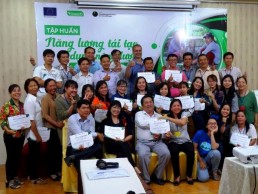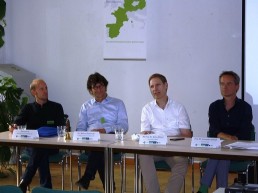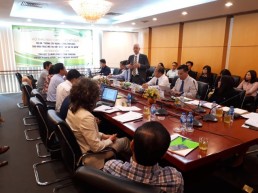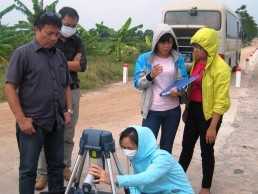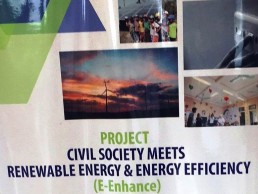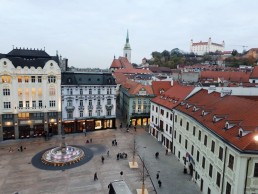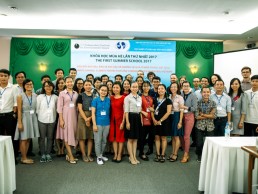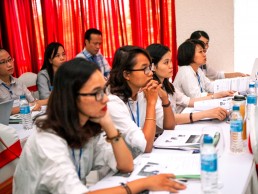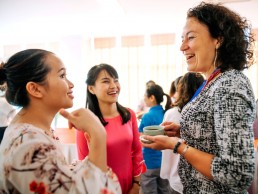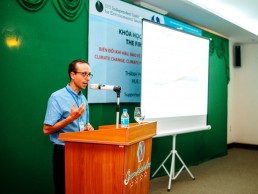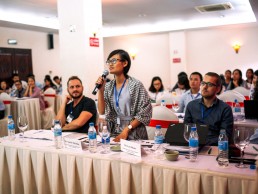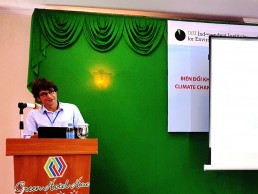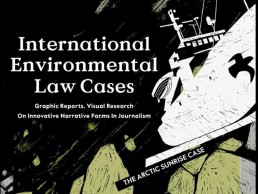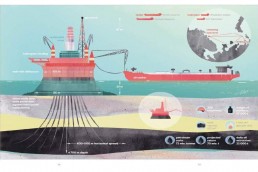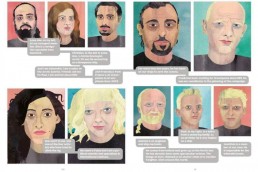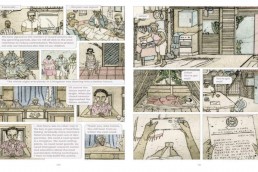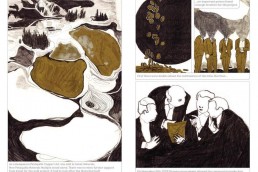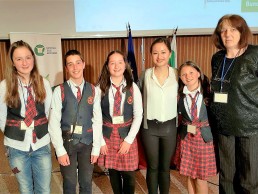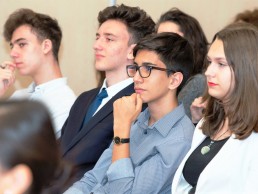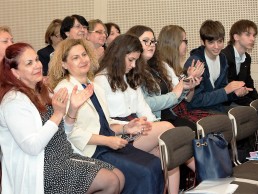E-Enhance: Successful realisation of the first series of workshops in Vietnam
06. June 2018
On the first of June 2018 the first series of five workshops with representatives of different societal organisations in Vietnam like women unions, youth organisations, farmers union, local unions, environmental organisations, local authorities, schools and universities ended successfully in Can Tho in the Mekong Delta.
In these training workshops participants received constitutive information regarding the status of the realisation of renewable energy and energy efficiency measures in Germany and Vietnam. In addition they experimented with “hands on models“ and preserved further knowledge about practical examples of the implementation in rural and urban areas.
Subsecuently the participants developed own implementation strategies for their regions by using the future workshop methodology. A field trip to the province of An Giang supplemented the workshop in Can Tho in order to visit photovoltaic applications, biogas plants and improved cook stoves. This field trip offered the participants the opportunity to exchange experiences with different users of these technologies.
Further training workshops took place in September 2017 in Hanoi, in January 2017 in Da Nang and in May 2018 in Ho Chi Minh City. The feedback of the participants of all training workshops was very positive.
Out of the five training workshops twenty persons will be identified to participate in a „train the trainer“ workshop in order to implement own seminars in field of renewable energy and energy efficiency in the future.
Germany discusses Access to Justice for a Greener Europe
31. May 2018
On 29 May 2018 the Independent Institute for Environmental Issues (UfU) e.V. held a workshop on „Sufficient Access to Justice in Environmental Matters in Germany?“ („Ausreichender Zugang zu Gericht in Umweltangelegenheiten?“). 22 participants discussed the challenges experienced with regard to access to justice in environmental matters. Amongst them ranked representatives from various environmental associations, representatives of the Federal Ministry for the Environment, the Federal Agency for Nature Conservation, laywers, judges and representatives from research and academia.
To begin the workshop, Karl Stracke, UfU, introduced the project and its main goals. Two keynote speeches followed: Prof. Dr. Alexander Schmidt, Hochschule Anhalt presented empirical results on the litigation practice of recognised environmental associations in Germany in the period of 2013-2016. RA Prof. Dr. Remo Klinger, Kanzlei Geulen und Klinger, Berlin, gave account on the current case law on standing in Germany.
During the subsequent discussion chaired by Dr. Michael Zschiesche, UfU, the participants especially identified the following aspects as the main difficulties and obstacles experienced with regard to access to justice in environmental matters in Germany:
After the 2017 amendment of the EAA (Environmental Appeals Act) many environmental issues remain outside the scope of its application. Those are for example strategic plans that are enacted by the legislator by law, lignite plans and wind energy plans, determination of air routes, annulment or amendment of ordinances on protected areas and product authorisations. Since national jurisprudence on the interpretation of the EAA remained inconsistent, E-NGOs often have to decide not to initiate proceedings due to the unclear admissibility situation. Another problem identified – resulting directly from the 2017 amendment of the EAA – was the newly introduced provision on “abusive or dishonest behaviour in appeal proceedings” (§ 5 EAA). Its unclear wording and the lack of any explanation of the underlying motivation posed an obstacle in many proceedings.
Another major challenge was seen in the immense costs for expert reports for judicial proceedings. And it was highlighted that standing in environmental matters for individuals is too restrictive and very limited under German procedural law.
The event was the kick-off workshop to the project „Access to Justice for a Greener Europe“, facilitated by the EU-LIFE programme.
Change the grounds: Project meeting in Edinburgh
11. May 2018
The second exchange meeting of all partners for the project “Change the grounds – Transforming spaces for outdoor activities” took place in Edinburgh from 23th to 24th April. The participants discussed mainly about the first draft of the handbook that comprised teacher’s approach to schoolyards. For the ERASMUS + project, three European environmental organizations are working together: Strom zivota from Slovakia, learning through landscapes from the UK and the Independent Institute for the Environmental issues from Germany. The aim of the project is to support teachers in re-designing schoolyards and to further involve natural playgrounds in their curriculum. In the first week of June, the UfU organizes a teacher training course, in which around 20 teachers from the project partner countries will participate.
Energy crops on post-mining sites in Vietnam: First results discussed in Hanoi
20. April 2018
In April 2018, UfU and a delegation of the German Environmental Ministry (BMU) met for a workshop in the Ministry of Natural Resources and Environment in Hanoi with representatives of the CPEP project partners, including MSP, the Vietnam Environmental Administration, Thai Nguyen University of Agriculture and Forestry, the Vietnam Land Science Association, and the mining companies Nui Phao and Vinacomin, the operators of the mines where the project’s pilot plantations of energy crops were implemented.
In the workshop the project partners discussed preliminary results from the three project sites, where the cultivation of energy crops was tested, exchanged lessons learned, and provided an outlook on the planned work during the remaining project duration.
Due to the project’s promising results and the potential for similar activities in Vietnam, the project partners expressed their support for an extension of the project in order to validate the collected data in long term investigations, and for the further implementation of the generated knowledge on the interrelations between climate protection and the cultivation of energy crops on post-mining sites in Vietnam.
UfU publication about the registration of contaminated sites in Vietnam
16. February 2018
Contaminated soils and water are among the most critical environmental issues in Vietnam. With the projects AnaViet and CapaViet, UfU supports Vietnamese authorities in the registration of contaminated sites. Within the two projects, experts from Northern Vietnam have been trained in the use of mobile X-ray fluorescence (XRF) spectrometers for the analysis and registration of heavy metals in soils. At the practically oriented workshops, first experiences in the on-spot-analysis of contaminated sites through mobile XRF have been gained.
The functionality and correct use of mobile XRF, as well as its potential uses and its limitations are now summarized in the English brochure „Utilization of Portable X-Ray Fluorescence-Spectrometers for the Registration of Contaminated Sites in Vietnam“. The free document can be downloaded here.
Workshop on Renewable Energy and Energy Efficiency in Da Nang, Vietnam
26. January 2018
The third workshop on the UfU-project E-Enhance took place from 01/24 – 01/26/2018 in Da Nang, Vietnam. In cooperation with GreenID, Florian Kliche from UfU led the workshop on the topics of renewable energy and energy efficiency, where 40 participants were able to work intensively and successfully on their own projects that they plan to implement later in their home provinces.
Kick off in Bratislava: New Project "Change the Grounds"
29. November 2017
The kick off meeting for the new project “Change the Grounds – Transforming spaces for learning activities” funded by the Erasmus+ Program of the European Union took place in Bratislava. UfU and its cooperating partners Strom zivota (Slovakia), INAK (Slovakia) and Learning through Landscapes (UK) shared ideas on the matter of outdoor learning and how teachers can implement these learning activities in the curriculum across countries in Europe. A manual and an online guide will be developed for the implementation of outdoor learning activities in schoolyards and surrounding green spaces. In order to give teachers new inspirations how they can creatively incorporate the natural conditions on-site into their lesson planning, a set of inspirations across school subjects will be developed. These inspirations will be the basis for using schoolyards or nearby public spaces more creatively in an educational context and encouraging children to explore and creatively acquire spaces.
Successful First Summer School on Climate Change in Hue, Vietnam
2. October 2017
For the first time, 29 young academics, environmental activists, and students from five Vietnamese provinces got together for 3 days in Hue City to learn, share their knowledge and discuss about climate change and its impacts in Central Vietnam. Beside the Mekong Delta, also Central Vietnam is very exposed to risks of climate change, like extreme rain and storms, flooding, but also droughts and extreme heat. The First Summer School on Climate Issues in Central Vietnam, funded by the Robert Bosch Foundation, was organized by the Mientrung Institute from the Academy of Sciences of Vietnam in cooperation with UfU. There were 10 speakers from four countries presenting: inter alia, Dr. Jakob Schewe from the Potsdam Institute for Climate Impact Research (PIK), Germany, Dr. Heidi Weiskel, Marine Biologist from the Environmental Law Alliance Worldwide (ELAW), USA, Chochoe Devaporihartakula from the Institute for Global Environmental Strategies (IGES), Thailand, and Dr. Katrin Brömme from the University of Bochum, Germany.
During the 3 days program, interesting debates and discussion came up, for example if Vietnam is strong enough to meet its targets from the Paris Agreement, if the objectives to increase coal power counteracts the achievement oft he targets. One oft he participants, Mr. Nguyen Thanh Huy from the Management Center of the Cham Islands Marine Protected Area, a local NGO, got to the heart of the problem by stating that Vietnam needs much more effort on climate protection, but it also needs desperately economic growth. Up to now both issues do not fit together.
The Summer School did not only include presentations from climate experts, but also elements that gave the participants the opportunity for active exchange among each other, like a World Café and short presentations from the participants on their research interests and possible solutions for climate impacts in their provinces. A further part of the Summer School focused on research approaches and model projects on climate issues in Vietnam. Here, the CPEP project on bioenergy crops cultivation on closed mining sites which is implemented by UfU in cooperation with the University of Bochum and funded by the International Climate Initiative (IKI) from the German Federal Environmental Ministry, was presented by Fabian Stolpe (UfU) and Dr. Katrin Brömme (Bochum University). The following discussion showed the high interest of the participants on more practical solutions in Vietnam.
The participants also acknowledged the good organizational work of Ms. Binh Minh from the Mientrung Institute (a former UfU fellow) with resounding applause. The participants announced that they want to stay in contact and initiated the idea of the creation of a network of Summer School attendees. With the promise to promote this idea in the Robert Bosch Foundation, Dr. Michael Zschiesche (UfU), who was mainly responsible for the development of the concept for the Summer School and the invitation of speakers and participants, closed the First Summer School on Climate Issues in Central Vietnam.
Further information and contact:
Dr. Michael Zschiesche michael.zschiesche@ufu.de
New Book: International Environmental Law Cases
- September 2017
Usually people speak of trials as being tasteless and boring whereas behind the scenes we often find the fate of people, impressive stories and human suffer as well as sensitive tragedies. Also nature could tell us those stories considering that it is being exploited and destroyed thousands of times and each day on a world wide scale.
In a unique project a group of young students from the Department of Design at the HAW Hamburg aims together with UfU to express legal conflicts through the language of graphic novels picking up the topic of nature devastation. Each story is based on a case that has been judged at court.
Content
– The Arctic Sunrise Case, pp 13 – 103
– The Amatique Bay Case, pp 104 – 125
– Gold Mining ih the Petaquilla Mineral District, pp 127 – 214
Editors: Karl Stracke, Michael Zschiesche (UfU e.V.) ; Alexandra Kardinar, Reinhard Schulz- Schaeffer (HAW Hamburg)
Berlin 2017
If you wish to order the book, please send an e-mail to: mail@ufu.de
News from Bulgaria and Romania: Energy saving projects continue
03 August 2017
In April and May milestones of the project “Climate protection through energy efficiency” have been achieved. In Sofia students and teachers from the pilot schools presented their interim results from the project on a milestone conference. A few weeks later workshops for municipalities in Bucharest took place.
During the conference in Sofia it was easy to see that the knowledge transfer that was among others realized through a study travel to Berlin and teacher trainings in Bulgaria has worked well. The schools showed a lot of dedication to the project. Some of them had put together several energy teams instead of just one. One student even programmed a virtual panoramic view of his school for their presentation. In one school the energy team performed measurements every day for weeks in order to create a building energy pass.
It was conspicuous that the probably poorest pilot school, the Hristo Masimov School, showed the most dedication to the project because it had already taken some energy saving measurements.
You could see from the posters the students made and from the pedagogical execution of the project that the guidelines from UfU had been used a lot. The Bulgarian partner had translated and distributed them.
In Bucharest the participants of two workshops for municipalities worked on the implementation of an incentive system for schools within the project.
During a smaller workshop only with the pilot municipality with Mures German experiences with measures for the participation of the community in environmental projects were presented and discussed.
One day later the bigger “Workshop”, the conference for municipalities, took place. Also in Bucharest students told the audience about what they had learned and they made it clear that the support of the authorities was vital to the success of the energy saving projects – not least because a Romanian energy efficiency law obliges schools and ministries to take part in energy efficiency measures of the country.
In the further course of the conference schools and representatives of the municipalities exchanged ideas on potential incentive systems.
Furthermore, in the afternoon wishes and goals of the participants of the conference were collected and matched with responsibilities to the individual project actors.
In both cities , Sofia and Bucharest, students performed measurements in the room of the event to emphasize the practical aspect of the energy saving project.



